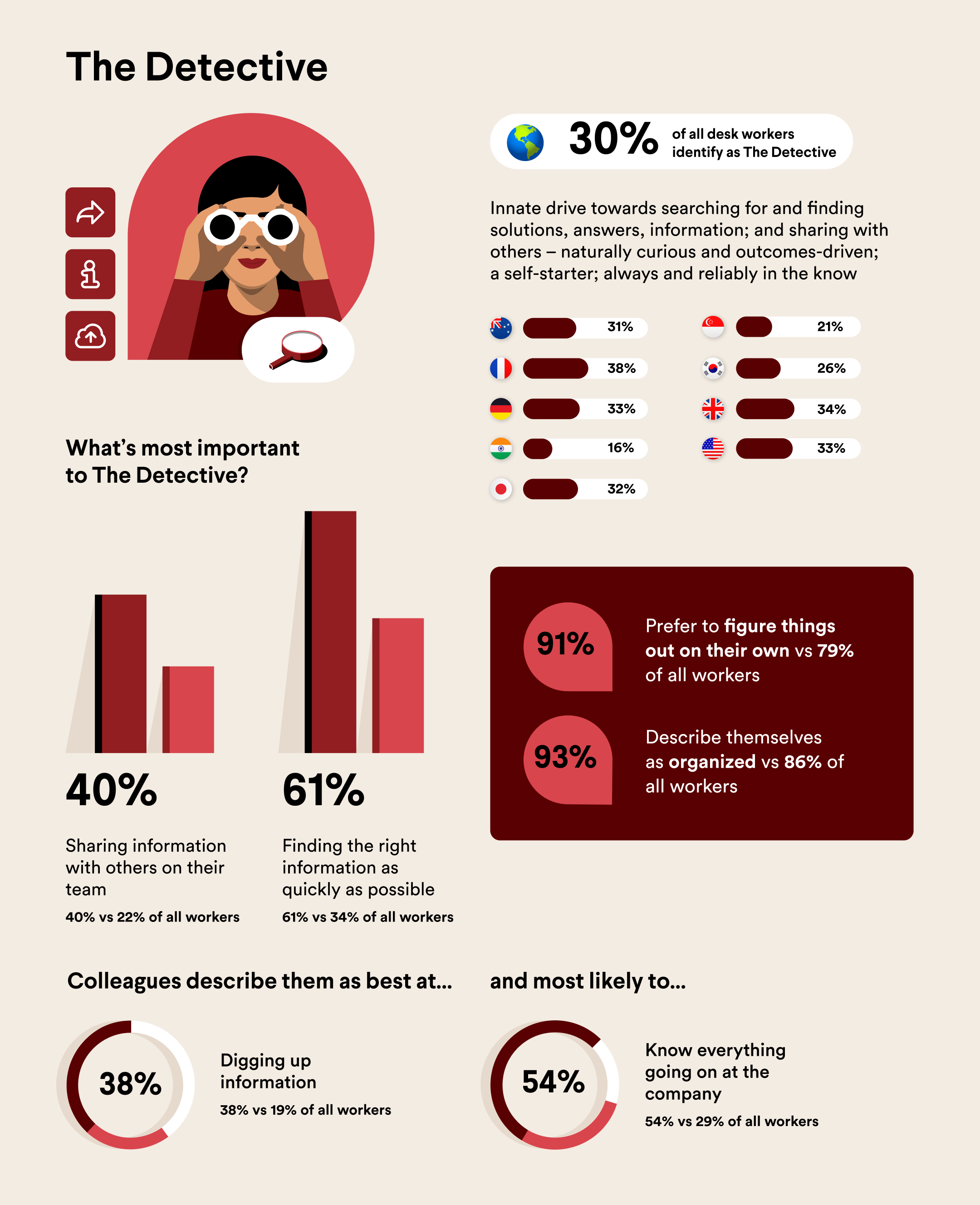Where human intuition fits amidst the growth of generative AI…

Generative AI tools may become near ubiquitous in the way we work over the next few years, but new global research into common workplace personas – which found that nearly one in three Australian workers consider themselves to be ‘Detectives’ who prefer to find things out for themselves – suggests that humans aren’t quite ready to give up their roles as authoritative founts of wisdom and information.

The research – conducted by productivity platform Slack and market research firm YouGov – polled 15,492 desk workers worldwide to better understand the diversity of psychological traits in contemporary workplaces. Thirty-one per cent of the 1014 Australian respondents to the survey said that they best match ‘The Detective’ workplace persona, which is characterised by a burning personal curiosity to find the information they need rather than having it presented to them.
The study identified five distinct workplace personas, with Detectives working alongside ‘Road Warriors’, ‘Networkers’, ‘Problem Solvers’, and ‘Expressionists’ that run the gamut of individual working styles and information processing preferences.
Detectives – who are more common in western countries such as France (38% of respondents), the UK (34%) and US (33%), but less common in Singapore (21%) and India (16%) – were found to be far more likely to value finding the right information as quickly as possible, and sharing that information with others on their team.
Over half (53%) of Detectives said they were driven by a sense of purpose and job security, describing themselves as organised with a preference for figuring things out on their own. They are also most likely to be described by their colleagues as good at digging up information and knowing everything that’s going on at the company.
This is one of the reasons Detectives are so valuable to their teammates, says Slack APAC technology evangelist at Salesforce, Derek Laney, even amidst the emergence of generative AI-powered bots.
“My experience at work is that people like to connect with each other to find the answers to their pressing questions,” Laney told iTnews. “This is why we see the importance of The Detective in teams. This persona has a really good understanding of where knowledge lies and how to access it, and a productivity platform like Slack is purpose-built for that.”
“Having the ability to find answers quickly and help others connect with that information easily is paramount – whether that’s via generative AI tools or through human action. But that approach shouldn’t be limited to The Detective persona alone. Building a culture within teams where people are encouraged to find the answer first before asking someone else is going to inherently boost your productivity.”
The power of intuition
With Gartner predicting that over 80% of enterprises will have deployed generative AI by 2026, desk workers are likely to increasingly look to those tools for answers rather than their colleagues.
Generative AI models are being trained on small data sets specific to one business or industry, theoretically making them more accurate and less prone to ‘hallucinations’ that have tainted their reputations as reliable sources of fact to date.
Law firm MinterEllison, for one, recently adopted a generative AI platform that is already being credited with saving up to five hours per day for half of those who have trialled it.
Such platforms will progressively be integrated with online collaboration platforms, putting more accurate answers at the fingertips of everybody in the team.
That’s likely to help many team members stop reinventing the proverbial wheel: “things go round and round in meetings because we’re not that great at capturing and reusing tacit information,” Laney said, noting that collaboration tools “are capturing more of this tacit work information and helping you synthesise that.”
Aiming to provide a range of ways for teams to engage, Slack has rolled out a broad range of collaboration tools that facilitate different types of communication – with features like huddles, clips, canvas and Slack Connect – complementing information services like Slack Atlas, and business process tools, such as Workflow Builder alongside over 2,600 app integrations.
Yet no matter how much new technology is adopted, and how quickly generative AI takes hold in the workplace, Laney warns that it’s premature to dismiss the humanistic elements, highlighting that Detectives will still be valued members of the team.
Many core information retrieval functions may be enhanced by generative AI tools, Laney said, but “not all things are going to be, or should be, automated.”
“Humans are really good at saying ‘I don’t feel quite right about that, although I don’t know why’,” he explained, highlighting the value of humans’ ability to “make non rational linkages between information. Neuroscientist Antonio Domasio said that we are not thinking machines that feel; rather, we are feeling machines that think.”
“That’s intuition, and that’s the brain doing its magic thing – and in partnership with AI you can start to use explorative tools to build out that intuition, and to say ‘Maybe that’s the answer that I’m looking for to validate what the brain is telling me.’”
To learn more about how Slack helps Detectives find their way to better productivity, click here.






 " title="
" title="